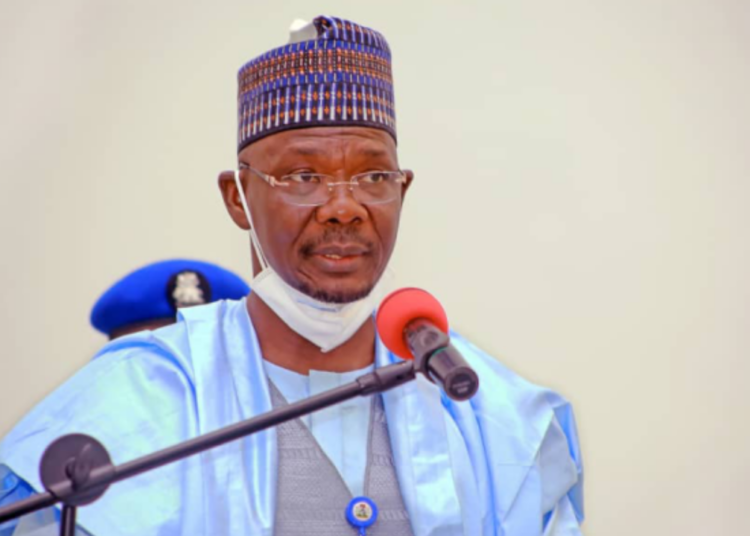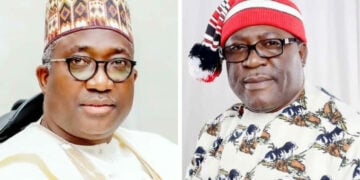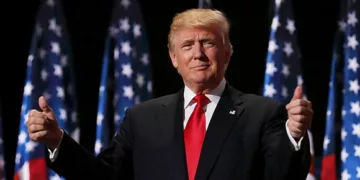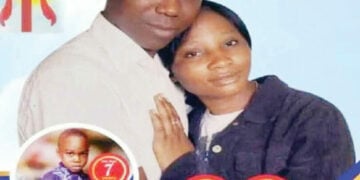As elected members of the National Assembly struggle the chart a separate and distinct path from the executive arm of government by electing their own leaders, similar, but less assertive scenarios are playing out at the state levels with governors increasingly tightening their grip on state assemblies.
This has led lawyers and members of the academia to question the independence of the legislative arm of government and the adherence to the concept of separation of powers where each of three arms of government serve as checks on the other two and no arm of government dominates the others.
At the federal level, the incoming APC government of Bola Ahmed Tinubu has been reported to have endorsed Sen. Godswill Akpabio as its preferred candidate to be Senate President and Hon. Tajudeen Abbas as Speaker of the House of Representatives.
Even hough some lawmakers are resisting and putting up a fight against what they see as establishment candidates, recent history of how principle officers in the National Assembly are selected suggest they are putting up a losing battle.
Chairman Voter Awareness Initiative, and Lagos-based lawyer, Wale Ogunade said, “The truth is that it will amount to self-deceit to think that the executive arm, as represented by the President-elect, would not interfere in the appointment of the leadership of the National Assembly. It has never happened before, and I do not believe it will start now.
“The law is evident on how the leadership should be elected, but politicians being what they are, would always seek to protect their interest.”
Ebun-Olu Adegboruwa (SAN) on his part said,
“The three arms of government are expected to operate independently and complimentarily, not dependent upon or patronising, in the manner that the 9th Assembly has carried on.
“No doubt, it is good to have a responsible legislature for harmonisation and development. Still, when it gets to the level where the executive is always right, then such a level of dubious cooperation should worry all lovers of true democracy.
“A legislature that cannot supervise and check the excesses of the executive is not worth its name at all. The truth is, such an assembly of persons cannot claim to represent anyone when the chips are down.
“As elected representatives of the people, the National Assembly is expected to assert the will of the people by invoking the relevant provisions of the Constitution in the discharge of their statutory responsibilities of lawmaking, supervising the executive arm and preventing waste and corruption.
“In choosing the leadership of the 10th National Assembly, therefore, the most important criteria should be competence, which can also include experience, qualification and, indeed, reputation.
“As the saying goes, the fish gets rotten from the head, so the kind of leaders to be entrusted with the management of the legislatures is vital to our national development. Of course, we need to be sensitive to gender parity, faith and, indeed, zoning, all of which could be accommodated in the primary consideration of merit as indeed, the right candidate can possess all these features simultaneously.
“Although the tradition is for the ranking members-elect of the political party with the highest number to produce the leadership of the legislature , it does not have to be along party lines, given that the laws governing the choice of leadership are internal to the legislature”, he said.
Reports from the politics across the states on who will likely emerge as speakers of the state assemblies paint an even more pathetic picture. Apart from factors like zoning and ranking of elected members, the most crucial selling point of candidates vying for the position of state assembly speaker is the endorsement of the state governor or sometimes, a political godfather.
In Kano for instance, all eyes are on Sen. Rabiu Kwakwanso, who many believe, calls the shots in the New Nigeria People’s Party, (NNPP), which is set to form the next government.
The NNPP won 26 out of 40 seats of the Kano State House of Assembly contest and there are no indications on who will lead the incoming state assembly as speaker and from which local government area. This and many more are the posers are on the lips of most of the political pundits in the state.
The closest rival, of the NNPP is the Ganduje led All Progressive Congress, (APC) in the state after the contest the party became second with 14 State houses of Assembly seats to her credit a development forcing her to take the minority seat in the house after Eight years of leading the majority.
This development followed the announcement of results by the Independent National Electoral Commission, (INEC) and the subsequent issuance of a Certificate of Return (COR) to each of the members-elect in the state.
On contact with Leadership on behalf of his principal, mouth piece of the governor-elect, Sanusi Bature Dawakin Tofa said Engineer Abba K. Yusuf is yet to settled on any of the 26 members for the Speakership position despite the series of meetings held to that effect.
However, reports indicated that there is every likelihood that the next speaker might be coming from one of the Eight renowned Metropolitan local governments areas of Fagge, Tarauni, Nassarawa, Kumbotso, Ungoggo, Gwale, Municipal and Dala local government areas these are slated for the highest-ranking legislative job in the state if all things went according to plan.
The NNPP stalwart attributed this to the dominant role played by the rural local governments in occupying the plumb job for years.
For instance Honourable Abdul Azeez Garba Gafasa who held from Ajingi local government served as speaker, Honourable Kabiru Alhassan Rurum Rurum, from Rano local government served as Speaker before his subsequent elevation as member representing Rano Bunkure, Kibiya federal Constuency and the outgoing Speaker who came from Makoda local government Honourable Hamisu Ibrahim Chidari who has contested and won House of Representatives member elect on the platform of his party the APC all the three came from outside Kano Metropolitan local governments.
And in spite of the politic dynamics that go into how a speaker is selected, experts have asserted that the principle of separation of powers between the three arms of government is not working in Nigeria.
Speaking in an interview with LEADERSHIP Sunday, the experts opined that the implementation of the doctrine does not seem satisfactory as carried out by successive governments.
A professor at the Ahmadu Bello University, Zaria, Salihu Adamu Dadari said the three arms of government are not doing what is supposed to be done. Dadari also said that the Senate or House of representatives should be abolished in order to pave way for development.
“The separation of power is not working in Nigeria. Nigeria is a country which is supposed to develop but unfortunately, our leadership is in a state of quagmire. They are not doing what is supposed to be done.
“In Nigeria we are not following law and order. The implementation is zero. Our legislatures are not even doing what is supposed to be done because of the corrupt system. You have to lobby for the legislature to give approval. No country will stand on corruption. Nigeria is a super corrupt country. Our judiciary is not working, it is malfunctioning. If now I’m found wanting and guilty, I’m taken to the court, if I have money I will be freed,” the professor added.
Normally, the contest for who emerges as speaker of a state assembly should be between lawmakers, but in Delta, it is turning into a proxy contest between the outgoing governor of the state, Ifeanyi Okowa and a self-styled godfather, Government Ekpemupolo, popularly called Tompolo.
The PDP has majority of the lawmakers in the state and is expected to produce the speaker. Another step is that the position of the speaker for the 8th Assembly must come from the Delta south senatorial district. The governor-elect is from Delta central while the deputy governor-elect is from Delta North.
Just as May 29, 2023, the inauguration date for the lawmakers is close especially when transition committee is already working. As it stands now, competence, experience, comportment and issue of high ranking may be jettisoned. However, if they are to be considered, the obvious candidate would have been Hon. Oboro Preyor, who has all the qualities.
Preyor is of Ijaw ethnic extraction, representing Bomadi constituency in Delta south. He is a four-term lawmaker. Presently, he is the deputy majority leader who once acted for long as Majority Leader.
The obstacle against him may be his closeness to Senator James Manager. He may be seen as a threat given the fact that Governor Ifeanyi Okowa and the governor-elect once fell apart with Manager after the Governorship primary in the state where Manager lost to Sheriff.
Hon. Fagurson Onwo is another contender. An Isoko man, representing Isoko South 2 constituency in Delta south. He is presently the Majority Leader. He has not hidden his interest for the job and has been lobbying. He has mobilized his people to work for his emergence. As a second term member, he has been working hard since he got the position of the majority leader accidentally to prove he is competent.
Another strong contender is Hon Emomotimi Guwor from Gbaramatu kingdom in Warri South West constituency, the Ijaw community where the present deputy governor, Deacon Kingsley Otuaro and Tompolo are from. In fact, he was a Personal Assistant to the deputy governor until he was elected a lawmaker. Guwor is a relative to Tompolo. It is even in the public domain that Tompolo is interested in his emergence as he was for the deputy governorship slot in 2015 as that is the only condition that can guarantee peace on the waterways.
The other two from Ishekiri nation, Delta south too are said to be working underground. They are ranking members from Warri North and Warri South Constituency 1. While Hon Fred Martins presently Deputy Majority Whip, from Warri North is handling the matter quietly, Hon Austin Uroye from Warri South 1, is said to have indicated interest.
With the struggle by strong stakeholders, the incumbent Governor and Governor Elect may not have their way to produce the next Speaker except through a consensus which is being considered.
Tight Race For Nasarawa Assembly Speaker
The race for the speakership of the 7th Nasarawa Assembly will no doubt be a tough one.
Analysts had predicted that the process would be crisis-ridden due to contending interests which they said, are also diverse.
They argued that unlike in the past when the assembly was made up of members of the ruling party only, the lawmakers that would be inaugurated in June belong to different political parties. Such situation, they posited, could alter the scale against the ruling All Progressives Congress (APC).
LEADERSHIP Sunday reports that the ruling party had a smooth run in its 2019 outing owing to the fact that among the 24 members that made up the 6th Assembly, it produced 20 against the main opposition Peoples Democratic Party (PDP)’s three and Zenith Labour Party (ZLP)’s one.
However, the outcome of the 2023 governorship and State Assembly poll put it in a serious disadvantage.
In the said election, the APC won 11 seats against PDP’s eight, while other minority parties like the Social Democratic Party (SDP) and New Nigeria Peoples Party (NNPP) have three and two respectively.
The votes tally show that the opposition parties collectively have 13 against the ruling party’s 11.
Analysts said unless the ruling party align with the smaller parties, its aspiration of retaining the speaker of the 7th Assembly would be a tall dream.
So far, three returning members have indicated interest for the position. They include Mr Daniel Ogah Ogazi representing Kokona East; Danladi Jatau, representing Kokona West and the incumbent speaker, Ibrahim Abdullahi Balarabe, who is from Umaisha /Ugya.
Soludo Stays Out Of Speaker’s Selection Process
The governor of Anambra state, Professor Chukwuma Soludo may not bring his influence to bear on the members of the state Assembly as it concerns their choice of the leadership of the coming 8th state assembly.
The Special Adviser to the governor on Political Matters, Dr. Alex Obiogbolu made it clear in an interview with LEADERSHIP Sunday that the governor will not meddle in the scheming of the members of the state assembly as it concerns their decision on who amongst them and the Senatorial zone that would produce the speaker or any other leadership of the state assembly.
He, however, emphasised that Prof. Soludo, like “any other patriotic Anambra citizen will wish that someone who is competent and able to lead his colleagues to work harmoniously with the executive arm of the government and help achieve the objectives of the All Progressives Grand Alliance -led administration in the state. That is to transform Anambra into an industrial, technological and leisure state will be chosen as the speaker of the state Assembly.
Obiogbolu emphasised further that as a democrat, Soludo will not dictate to the lawmakers concerning their choice of the leadership of the legislature when he (Soludo) belongs to the executive branch of the government.
Meanwhile, LEADERSHIP Sunday gathered that zoning might not play strong influence in the choice of state assembly leadership because even though the South and Central Senatorial zones of the state produced the incumbent governor and deputy governor respectively, the front-runners for the Speakership of the state Assembly are from the two zones.
Sources close to the state Assembly hinted that the front-runners for the Speakership are Hon Okechukwu Ejike (Anaocha 11) and Hon. Chukwuemeka Okoye ( Awka-south 11) both from Anambra Central Senatorial zone of the deputy governor, Dr. Onyeka Ibezim, and, Hon. Emma Nwafor (Orumba-South state constituency) in Governor Soludo’s Anambra South senatorial zone.
Hon. Patrick Udeoba (Anambra west state constituency) from Anambra North is also filing out for the state Assembly Speakership contest, a source said that though he is a ranking member like his other co-contestants from both the Anambra Central and Anambra South, he does not have the needed leadership charisma required for the Speakership.
Two Lawmakers Are Frontrunners In Sokoto
Two Sokoto state lawmakers are being considered for the office of Speakership at the state House of Assembly. The duo are two term lawmakers and in the consideration of power equation, are from the Southern senatorial district of the state.
First is Abubakar Shamaki Yabo, representing Yabo local government. He his former Sokoto state NLC chairman and former chairman of Yabo local government. The other lawmaker being considered by the party bigwigs is Tukur Bala Bodinga, representing Bodinga local government area.
The odd are against Honourable Abubakar Shamaki despite his level of maturity and exposure because his posture suggests he might not be a stooge to the whims and caprices of the powers that be in the party. He is also alleged to be too close to a former APC governorship aspirant, Ambassador Faruk Yabo, who recently defected to the PDP.
Honourable Tukur Bodinga, a two term lawmaker, in his early forties, is believed to lack the required exposure and experience to lead the calibre of the composition of the thirty-man, state assembly.
An Obvious Candidate In Osun
37-year-old Adewale Egbedun is the obvious preferred candidate of the governor of Osun State, Senator Ademola Adeleke for the post of Speaker of Osun State House of Assembly in the 8th Assembly.
Egbedun representing Odo Otin state constituency, who was elected on the platform of the Peoples Democratic Party (PDP) if elected is expected to preside over a 26-member House made up of 25 PDP members and one APC member.
Though a first timer, Egbedun may benefit from the age-long zonal arrangement of Governor, Deputy Governor and Speaker emerging from different senatorial seat since the two returning PDP lawmakers-elect, Hon. Adewunmi Babajide Kofoworola comes from the Governor’s district and Adewumi Adeyemi from the Deputy Governor’s Senatorial District.
Amaewhule, Likely Speaker of Rivers 10th Assembly
The majority leader of the Rivers State House of Assembly, Hon. Martins Chike Amaewhule, is likely to emerge as the Speaker of the 10th Assembly.
Amaewhule, who represents Obio-Akpor Constituency 1, has been in the House since 2011.
A close ally of Governor Nyesom Wike, the lawmaker is the longest serving member of the Rivers State House of Assembly, having been re-elected o March 18, 2023.
He enjoys the support of majority of state lawmakers, including new members-elect.





